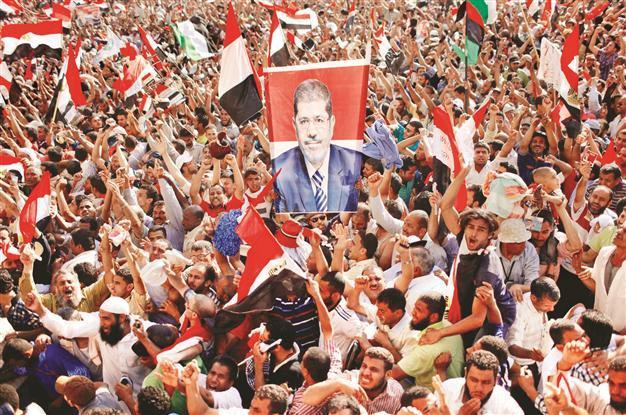Morsi declared winner in Egypt’s presidential vote
CAIRO

Supporters of Muslim Brotherhood’s presidential candidate Mohamed Morsi celebrate
his victory announced yesterday at the election at Tahrir Square in Cairo.
Muslim Brotherhood candidate Mohammed Morsi was declared
Egypt’s first democratic president yesterday by the state election committee after defeating Hosni Mubarak’s former prime minister with 51.7 percent of last weekend’s run-off vote.
Thousands of brotherhood supporters burst into cheers on Cairo’s Tahrir Square, waving national flags, setting off fireworks and chanting “Allahu Akbar” (God is Great) even though their joy was tempered by continuing army power over the political system. “Say! Don’t fear! The military must go!” crowds chanted.
“This is a testament to the resolve of the Egyptian people to make their voice heard,” a spokesman for Morsi said.
Yesterday’s loser, Ahmed Shafiq, a former Air Force commander and Mubarak’s last prime minister, offered no immediate reaction but has previously said he would offer to serve in a Morsi administration.
Morsi, 60, won the first round ballot in May with a little under a quarter of the vote. He has pledged to form an inclusive government to appeal to the many Egyptians, including a large Christian minority, who are anxious over religious rule.
Egypt’s military ruler, Field Marshal Hussein Tantawi, congratulated Morsi. “Field Marshal Hussein Tantawi congratulates Dr. Mohamed Morsi on winning the presidency of the republic,” Egyptian media reported.
Hamas congratulates MorsiPalestinians in Gaza celebrated Morsi’s victory as well, with Hamas hailing a “historic moment.”
Senior Hamas official Mahmud Zahar told Agence France-Presse that the victory was “a historic moment and a new era in the history of Egypt,” as Gazans fired volleys of celebratory gunfire in the streets of the Palestinian territory.
The military council will retain control of the biggest army in the Middle East, whose closest ally is the United States. Morsi has said he will respect international treaties, notably one that was signed with Israel in 1979, on which much U.S. aid depends.
Morsi will not enjoy the extent of modern, pharaoh-like powers exercised by Mubarak; those have been curtailed by a military establishment which will decide just how much he will be able to do in government. The brotherhood had said it would press on with protests against recent army rulings to curtail the powers of the new president.
Still, Morsi’s victory in the country’s first free presidential election breaks a tradition of domination by men from the Armed Forces, which have provided every Egyptian leader since the overthrow of the monarchy 60 years ago, and installs in office a group that drew on 84 years of disciplined grassroots activism to catapult Morsi into the presidency.
He has promised a moderate, modern Islamist agenda to steer Egypt into a new democratic era where autocracy will be replaced by transparent government that respects human rights and revives the fortunes of a powerful Arab state long in decline.
Questions remain over the extent to which Morsi will operate independently of other brotherhood leaders once in office, as his manifesto was drawn up by the group’s policymakers. “I will treat everyone equally and be a servant of the Egyptian people,” Morsi said at his campaign headquarters in Cairo shortly after polling ended last week.
